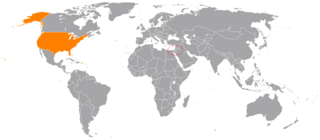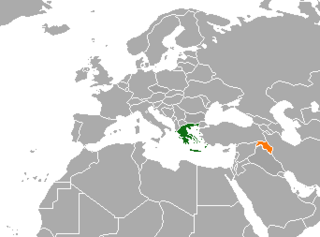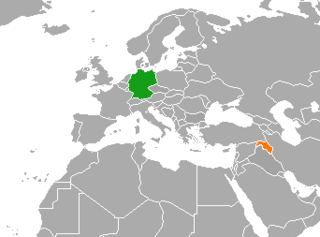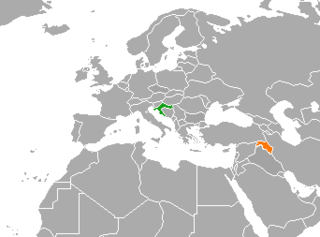
The Iraqi Kurdistan–Israel relations covers the historical background of relations between the Kurdish and Jewish peoples, and the current political and economic relations between the Iraqi Kurdistan and the State of Israel.

The bilateral relations between the Republic of Iraq and the Republic of India have traditionally been friendly and collaborative. Cultural interaction and economic trade between Indus Valley and Mesopotamia date back to 1800 BCE. The 1952 Treaty of Friendship established and strengthened ties between contemporary India and Iraq. By the 1970s, Iraq was regarded as one of India's closest allies in the Middle East.

Iraq does not recognize Israel and consequently the two countries do not have any formal diplomatic relations. Iraq declared war on the newly established Jewish state in 1948 and since then the two countries have technically been in a state of war. Iraqi forces participated in wars against Israel in 1967 and 1973.

The United States of America does not recognize the State of Palestine and therefore officially maintains no diplomatic exchanges nor consular services with Palestine.

The Palestinian–Serbian relations are bilateral relations between the State of Palestine and the Republic of Serbia. Relations between Serbia and Palestine have been very close and friendly. Even though Serbia had reestablished relations with Israel in 1991, its relations with Palestine still remain excellent.

Relations of Kurdistan Region of Iraq with foreign states and organizations are conducted by the Kurdistan Regional Government (KRG). Political stability and a rapidly developing economy have given the KRG the opportunity to pursue a foreign policy independent from the central government's. The KRG's primary body for directing its foreign affairs is the Department of Foreign Relations (DFR). The DFR's foremost objectives are to raise the global profile of the Kurdistan Region, improve the Region's international ties with various governments and international organizations, and present emerging business opportunities in the Kurdistan Region to regional and international actors.
The Middle East region plays a vital role in India's economy as it supplies nearly two third of India's total oil import, bilateral trade is also flourishing in recent years particularly with UAE and other Arab states of the Persian Gulf. Over the years, millions of Indians mostly working class have migrated to the Persian Gulf region looking for jobs and they account for a sizeable share in the total remittances received from abroad. Indian External Affairs Ministry refers the region as West Asia and not as Middle East which is a more popular attribution, particularly in the Western countries.

Hungary–Kurdistan Region relations are bilateral relations between Hungary and the Kurdistan Region. Hungary has been represented in Kurdistan Region through a consulate general since November 2014, while Kurdistan Region has no representation in Hungary. Nevertheless, the relations are characterized by several high-level talks and close ties. The Kurdish President Massoud Barzani has visited Hungary in 2012 and in 2015 on official visits.

Czech Republic–Kurdistan Region relations are bilateral relations between the Czech Republic and the Kurdistan Region. The Czech Republic is represented in the Kurdistan Region through a consulate general in Erbil since 2006, while the Kurdistan region has no representation in the Czech Republic. Relations between the two are characterized by high level talks and cooperation against ISIS. Kurdish President Massoud Barzani visited the Czech Republic in 2015, meeting President Miloš Zeman and other senior government officials. In November 2015, Czech President Miloš Zeman said that he believes the Kurdistan Region will soon become independent.

Kurdistan Region–Poland relations are bilateral relations between Kurdistan Region and Poland. Kurdistan Region is represented in Kurdistan Region through a representation in Warsaw since 2004, while Poland has a consulate general in Erbil since 2012. In 2005, Polish Prime Minister Marek Belka, Foreign Minister Adam Rotfeld, Minister of National Defense Jerzy Szmajdziński and Minister of Culture Waldemar Dąbrowski met Kurdish President Masoud Barzani and Prime Minister Nechirvan Barzani in Erbil and stated their support for the reconstruction of Iraq, including Kurdistan Region.

Kurdistan Region–Netherlands relations are bilateral relations between Kurdistan Region and the Netherlands. While Kurdistan Region has no representation in the Netherlands, the Netherlands has a consulate general in Erbil since 2012. The Netherlands has a military presence in Kurdistan Region and have aided the region with humanitarian aid. The Netherlands also contributed to reforms of the Kurdish economy with 250,000 euros in 2017. In August 2016, Dutch Prime Minister Mark Rutte visited Kurdistan Region and met with high-ranking Kurdish officials and deployed Dutch soldiers. Concerning Kurdish independence, Dutch MP Harry Van Bommel stated that: "I will ask my party to support independent Kurdistan because I think independence is the best way to secure the future of the people in this Region".

Greece–Kurdistan Region relations are bilateral relations between Greece and Kurdistan Region. Greece has an economic and commercial office in Erbil, while Kurdistan Region has no representation in Greece. In February 2017, Greek Foreign Minister Nikos Kotzias described Kurdistan as having a geostrategic role in the region and constitutes an important element in Greek geostrategic policy, and these were the reasons Greece opened a consulate general in Erbil in May 2016. In an interview with Alpha Radio, Kotzias stated that the Kurdish independence referendum in September 2017 was guaranteed by the Iraqi constitution and that Kurdistan Region has a right to hold it. Vice-President of the Greek party New Democracy Adonis Georgiadis has stated that his party supports the referendum and the Kurdish right to self-determination.
Kurdistan Region–United Arab Emirates relations are bilateral relations between Kurdistan Region and United Arab Emirates. While Kurdistan Region has no representation the United Arab Emirates, the latter has a consulate general in Erbil since 2012. The opening of an Emirati consulate general was discussed during a visit in Erbil by Emirati Foreign Minister Abdullah bin Zayed Al Nahyan in February 2011. Kurdish specialist Marianna Charountaki believes that the United Arab Emirates "interacts with the KRG as a de facto state entity". Kurdish Prime Minister Nechirvan Barzani has described the ties with the United Arab Emirates as being: "very important to the Kurds. They have offered their services to help us in the region. We have very good relations with all [the GCC members] but ties with the UAE are closer. The UAE are interested in investments and energy". Emirati Minister of Cabinet Affairs & the Future Mohammed Al Gergawi described the ties between the United Arab Emirates and Kurdistan Region as "good". He stated that: "We will need the Kurdistan Region and the Kurdistan Region will need us because we have the same principles and concerns".

Kurdistan Region–Romania relations are bilateral relations between Kurdistan Region and Romania. Ties between Romania and the Kurdistan date back to the mid-20th century when Romanian leader Nicolae Ceaușescu held meetings with Kurdish rebels fighting the regime of Saddam Hussein.

Germany–Kurdistan Region relations are bilateral relations between Germany and Kurdistan Region. Germany has a consulate general in Erbil since 2012, and Kurdistan Region has a representation in Berlin since 1992. Many high-level meetings have been held between the two parties, including a visit to Berlin by Kurdish President Masoud Barzani in 2009, where he met with German Chancellor Angela Merkel and Foreign Minister Frank-Walter Steinmeier. In 2014, President Barzani described Germany as "one of Kurdistan Region’s staunch allies in the war against the Islamic State." German Consul General Marc Eichhorn described the relations as "excellent".

Croatia–Kurdistan Region relations are bilateral relations between Croatia and Kurdistan Region. Croatia has plans of opening a consulate in Erbil, while Kurdistan Region has no representation in Croatia. In August 2014, after a request by the United States, Croatian authorities sent an undisclosed amount of weapons to Kurdistan Region. The weapons were mostly of Yugoslav origin. Later, it was revealed that the military aid included 20,000 pieces of HS Produkt VHSs.
Jordan–Kurdistan Region relations are bilateral relations between Jordan and the Kurdistan Region. Jordan is represented in Kurdistan Region through a consulate general in Erbil since 2011, while Kurdistan Region has no representation in Jordan. Relations are described as historical, dating back to the times of Mullah Mustafa Barzani and King Hussein bin Talal. As a response to the unilateral Kurdish independence referendum in September 2017, Jordanian Foreign Minister Ayman Safadi stated that the issue was an internal Iraqi affair and that Jordan did not interfere in other countries' domestic affairs. The Jordanian Consul General in Erbil described ties as "strong and solid" in August 2018.
Kurdistan Region–Kuwait relations are bilateral relations between the Kurdistan Region and Kuwait. While Kurdistan Region has no representation in Kuwait, the latter has a consulate general in Erbil since 2015. Relations are described as a 'historic friendship' and 'brotherly'. Kuwait has substantial economic investments in the Kurdish region which amounted to over $2 billion in 2017.





















